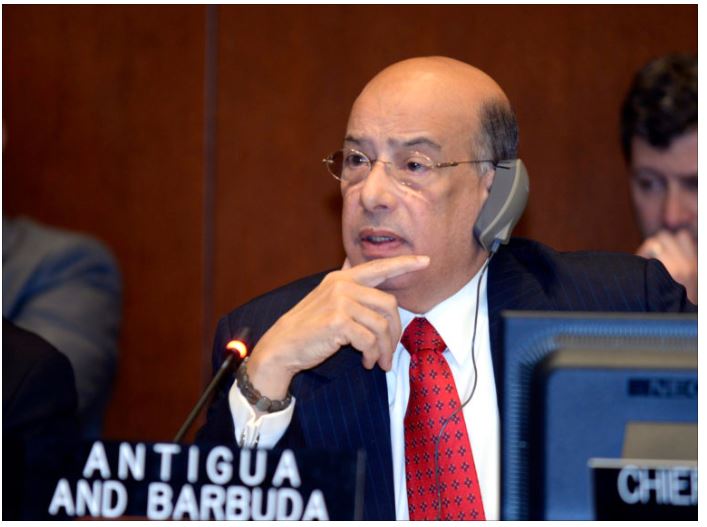By George C. Brathwaite (PhD)
“Since the CSME was inaugurated here in Jamaica 12 years ago, we all agree that much has been accomplished under its regimes. But we have not achieved as much as we should have by now. Major policy decisions and adoption of legal instruments take much too long to be negotiated. We must do more and do it more quickly. The success of the CSME is being judged, by the public, on the basis of our implementation of the measures agreed to, that allow our citizens and businesses to benefit.” (CARICOM Secretary General, Ambassador Irwin LaRocque, at Opening of 39th Meeting, Conference of Heads of Government of CARICOM, Jamaica, July 4th, 2018)
The Conference of the Heads of Government took centre stage in Montego Bay, Jamaica. Thousands of eyes were not only on the colourful setting, but on the flamboyant smile of Barbados’ newest leader and first female prime minister. Several important agenda items were discussed; commitments were made that are sure to have deeper implications for the Community’s secretariat and its member states. Ambassador LaRocque’s assessment prefacing this article is more than a mouthful; it seemed a call for urgent action.
Significant, was Barbados’ purposeful and energetic input that would summon other leaders to close the existing gaps between the people’s lived realities and the customary side-stepping. It is those types of posturing that have together produced the wide implementation deficit across the region, thereby denying citizens and businesses deserved benefits. Prime Minister Mia Mottley could hardly have stated truer words when in her unassuming way she charged that “political leadership must facilitate and shepherd, not control and stifle.” Straight out of the box, the leaders of the Caribbean Community (CARICOM) were reminded that it is the region’s people who ought to matter most in policy formulation and delivery.
Within the context of integrated development and the mechanisms affecting the populations of these small countries, Prime Minister Mottley was able to let flow her love, her ideas, and her dedication for wanting to improve the livelihoods of people. While admitting leadership delinquency and tardiness, Miss Mottley suggested that not much had changed or had gone forward over the last 10 years, and that old territorial fears persisted.
Nonetheless, the freshness of Prime Minister Mottley’s speech, although reflective in some areas, channelled the memories of the pioneers of the Caribbean’s regional integration movement. The freedom to think and to explore possibilities that would enhance the region captured the imagination of the listening audience across the CARICOM. Surely, Miss Mottley’s speech could be summed up as a quest to fight for a regionalism in which freedom and opportunity would coexist as a practicality rather than as a convenient posture. This writer, while assessing Miss Mottley’s inaugural remarks to the Conference of CARICOM Heads, recalled Nelson Mandella – the former President of post-apartheid South Africa – contending that: “For to be free is not merely to cast off one’s chains, but to live in a way that respects and enhances the freedom of others.”
Prime Minister Mottley, by invoking the name of one of Barbados’ National Heroes – the Right Excellent Errol Barrow also took to embracing the true vitality of the Caribbean region. PM Mottley ably asserted Barrow’s bold and undeniable claim that: “the regional integration movement is a fact of daily experience. It is a reality which is lived but which we have not yet been able to institutionalise.” What followed from that point of mindful linkage between formal policies and the formalities affecting people were Miss Mottley’s sharing of genuine will and determination to fix the slack that obtained under her predecessor regarding the Caribbean Single Market and Economy.
Indeed, and as if to inspire the leaders and to give credence to the voices of the people, PM Mottley challenged the Conference of Heads to “give our people the scope to express their natural inclination of togetherness and inclusion in ways that are productive and beneficial to the region.” Miss Mottley touched on the need for the region to increase on its wide and varying sectoral successes. She wittingly and excitedly went from the need for sharing information to building resources and resilience; she aptly spoke of the freedom to turn away from prohibitive regulation to embracing a facilitative regimen inclusive of capable transportation enhancements.
Additionally, the Barbadian leader was adamant on the essentiality of giving vital and productive expression to the region’s youth through the global and technological highways. Her insistence was for renewed vigour regarding investment flows and cross-border partnerships among Caribbean people and entities. Miss Mottley’s presence and intervention symbolised precisely the things for educating, informing, and motivating the region’s people.
Mia Mottley courted challenge confidently and put her intent into the open arena of CARICOM. She advocated for the expansion of opportunities for Caribbean people advising that it is responsible and prudent to address issues on the process to verify Certificates of Recognition of CARICOM Skills Qualification. Mottley bemoaned the length of time and the discouragement that became part of the process for accreditation and verification. She noted that in this contemporary age of technological advancements and digital communications, it is regrettable that the regional labour market should be saddled with mechanisms which were more handicap than optimal for the people. Miss Mottley advocated that “we must be able to do better at real-time communication, particularly as we go forward in the issuance of skills certificates and diplomas that will allow for more ease of verification.”
On the urging of things that would have occurred in Barbados, Miss Mottley was unafraid but forthright in putting the issue of contingent rights to be a matter deserving resolve. Questions still are being asked why is it that CARICOM citizens working and paying taxes like Barbadians in Barbados, and being allowed to vote, cannot access similar or certainly reasonable healthcare or other social services without attracting extra user fees? The fact is and has been documented by this writer, ‘without contingent rights, intra-regional migrant labour and the practicality of freedom of movement for categories of workers become hollow and discouraging’.
The fact that Miss Mottley is proactive after seeing the need to remove the discriminatory practice of less than satisfactory treatment to CARICOM’s immigrant workers and their dependants in Barbados, augurs well. The region can start being progressive in public policy while ironing out any difficulties that may exist in regional affairs. Thus, the following countries must be commended for their willingness to sign the protocol addressing the problematic feature of contingent rights. The countries are: Barbados, Grenada, Haiti, Jamaica, St Lucia, St Vincent and the Grenadines, and Suriname.
On a final note, congratulations and best wishes are for attorney and political activist David Comissiong on his appointment by Prime Minister Mottley as Barbados’ Ambassador to CARICOM. Hardly anyone would deny Mr. Comissiong’s knowledge and activities that are supportive of Caribbean civilization and the need for deeper functional cooperation among CARICOM’s member states. Comissiong’s intent, however, has similarly been misconstrued based on perceptions of his ideology. Ambassador Comissiong’s rejection of hegemonic behaviour and his strong preference for resilience to the encroachment of foreign political and economic forces should help to reinforce the view that in the region, unity and survival are important for the type of integrated development which benefits the region’s people. Barbados can be a pivotal actor in making CARICOM work for the prosperity of all the Caribbean people.
(Dr George C. Brathwaite is a part-time lecturer at the University of the West Indies, Cave Hill Campus, and a political consultant. Email: [email protected]).



